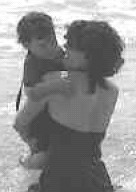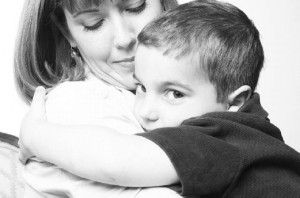By Marie Blois, MD, member of API’s Board of Directors
 Biologically, babies need to be carried in order to thrive. Studies have shown that otherwise well-nourished and cared for infants who are deprived of human touch fail to thrive and can even die. Good things happen when baby is carried. Research shows that babies who are held often:
Biologically, babies need to be carried in order to thrive. Studies have shown that otherwise well-nourished and cared for infants who are deprived of human touch fail to thrive and can even die. Good things happen when baby is carried. Research shows that babies who are held often:
- Cry less — Studies have shown that the more babies are held, the less they cry. The long-term consequences of letting infants cry without responding are just beginning to be understood. One study found that letting babies cry permanently alters the nervous system by flooding the developing brain with stress hormones. Responding quickly to your crying baby is an investment: the less she cries now, the more peaceful the upcoming year. It’s well worth your effort.
- Are more calm and content — Carried babies have a more regular respiratory rate, heart rate, and steady internal body temperature. Even very tiny premature babies can be carried safely in a sling without danger of compromised breathing or heart rate. Regularly carrying a baby encourages baby to feel secure and content.
- Sleep more peacefully — Keeping baby close helps organize his sleep-wake cycles. Naptimes are spent in constant motion, close to mother’s heart and nighttime is dark and still with a loved parent nearby. One study of premature infants found that babies had longer intervals of quiet sleep when they had skin-to-skin contact with mother.
- Develop better — Babies who are held experience human touch and movement. This stimulation has been shown to have a positive effect on baby’s development. Carrying baby enhances motor skills by stimulating the vestibular system (used for balance). Carrying baby naturally limits the time baby spends in hard plastic carriers, such as car seats, automatic swings, and such. Holding baby while moving counts as “tummy time.”
Our babies are clever. They are born knowing how to signal their biological needs. They root when they need to nurse, smile when they need vital eye contact for optimal brain development, and they love to be held. There are good biological reasons for these behaviors: they help babies survive and thrive.
Excerpted from: Blois, M. (2005). Babywearing: The benefits and beauty of this ancient tradition. Amarillo, TX: Hale Publishing. www.ibreastfeeding.com.
 Depression — a mental illness marked by unrelenting sadness and hopelessness that permeates the lives of an estimated one in 18 people — is among the most prevalent medical disorders in today’s world, affecting 12 percent of women, 7 percent of men, and 4 percent of adolescents in a given year. Eight percent of adults will develop depression sometime in their life, and women are most prone — their lifetime risk is 20 percent.
Depression — a mental illness marked by unrelenting sadness and hopelessness that permeates the lives of an estimated one in 18 people — is among the most prevalent medical disorders in today’s world, affecting 12 percent of women, 7 percent of men, and 4 percent of adolescents in a given year. Eight percent of adults will develop depression sometime in their life, and women are most prone — their lifetime risk is 20 percent. I frequently receive e-mail from parents who practice Attachment Parenting (AP) across the United States and in other countries asking for help and support in custody cases when they are contemplating shared joint custody of their infants, toddlers, and preschool children.
I frequently receive e-mail from parents who practice Attachment Parenting (AP) across the United States and in other countries asking for help and support in custody cases when they are contemplating shared joint custody of their infants, toddlers, and preschool children. Welcome to Motherhood!
Welcome to Motherhood! All babies cry. And all parents are continually striving to find the best way to respond to those cries.
All babies cry. And all parents are continually striving to find the best way to respond to those cries.